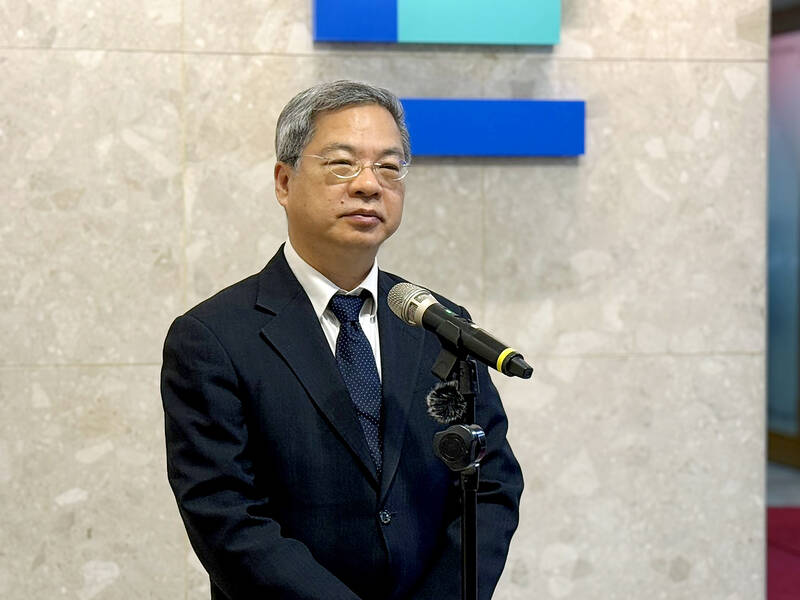Taiwan’s economic growth rate could exceed 3 percent next year, supported by robust demand for artificial intelligence (AI) applications despite a higher base this year, Minister of Economic Affairs Kung Ming-hsin (龔明鑫) said yesterday.
The central bank last month forecast that the economy would grow 2.68 percent next year as emerging-technology applications continue to thrive, but it also warned that US tariff policies could curb global trade growth amid a high base this year.
The Directorate-General of Budget, Accounting and Statistics in August forecast 2.81 percent GDP growth next year.

Photo: CNA
Several research institutions have predicted about 2.5 percent growth for next year.
Compared with those forecasts, Kung said he was “quite optimistic” that Taiwan’s economy could grow more than 3 percent next year after an expected expansion of more than 5 percent this year, as demand for AI-related applications has continued to grow significantly and the trend is expected to persist.
Asked about a case of African swine fever confirmed at a hog farm in Taichung’s Wuci District (梧棲) on Tuesday, Kung said that state-run Taiwan Sugar Corp (Taisugar, 台糖) would continue to improve disease prevention measures at hog farms.
Taisugar on Wednesday said in a statement that it had activated the highest level of biosecurity measures to ensure the safety of pig farms.
As Taisugar sells about 10 tonnes of pork daily and has 362 tonnes of frozen pork in stock, it is expected to be able to meet short-term demand, Kung said.
If demand increases, Taisugar would work with the Ministry of Agriculture to ensure stable supply and prevent supply chain disruptions, he added.
“In terms of volume, Taisugar still has enough capacity to meet demand, so there should be no problem” Kung said.
Regarding the potential effect on the restaurant sector, Kung said the situation still needed to be closely monitored, adding that the government’s top priority was to ensure a stable supply of pork.

Taiwan Semiconductor Manufacturing Co (TSMC, 台積電) last week recorded an increase in the number of shareholders to the highest in almost eight months, despite its share price falling 3.38 percent from the previous week, Taiwan Stock Exchange data released on Saturday showed. As of Friday, TSMC had 1.88 million shareholders, the most since the week of April 25 and an increase of 31,870 from the previous week, the data showed. The number of shareholders jumped despite a drop of NT$50 (US$1.59), or 3.38 percent, in TSMC’s share price from a week earlier to NT$1,430, as investors took profits from their earlier gains

In a high-security Shenzhen laboratory, Chinese scientists have built what Washington has spent years trying to prevent: a prototype of a machine capable of producing the cutting-edge semiconductor chips that power artificial intelligence (AI), smartphones and weapons central to Western military dominance, Reuters has learned. Completed early this year and undergoing testing, the prototype fills nearly an entire factory floor. It was built by a team of former engineers from Dutch semiconductor giant ASML who reverse-engineered the company’s extreme ultraviolet lithography (EUV) machines, according to two people with knowledge of the project. EUV machines sit at the heart of a technological Cold

Taiwan’s long-term economic competitiveness will hinge not only on national champions like Taiwan Semiconductor Manufacturing Co. (TSMC, 台積電) but also on the widespread adoption of artificial intelligence (AI) and other emerging technologies, a US-based scholar has said. At a lecture in Taipei on Tuesday, Jeffrey Ding, assistant professor of political science at the George Washington University and author of "Technology and the Rise of Great Powers," argued that historical experience shows that general-purpose technologies (GPTs) — such as electricity, computers and now AI — shape long-term economic advantages through their diffusion across the broader economy. "What really matters is not who pioneers

TAIWAN VALUE CHAIN: Foxtron is to fully own Luxgen following the transaction and it plans to launch a new electric model, the Foxtron Bria, in Taiwan next year Yulon Motor Co (裕隆汽車) yesterday said that its board of directors approved the disposal of its electric vehicle (EV) unit, Luxgen Motor Co (納智捷汽車), to Foxtron Vehicle Technologies Co (鴻華先進) for NT$787.6 million (US$24.98 million). Foxtron, a half-half joint venture between Yulon affiliate Hua-Chuang Automobile Information Technical Center Co (華創車電) and Hon Hai Precision Industry Co (鴻海精密), expects to wrap up the deal in the first quarter of next year. Foxtron would fully own Luxgen following the transaction, including five car distributing companies, outlets and all employees. The deal is subject to the approval of the Fair Trade Commission, Foxtron said. “Foxtron will be